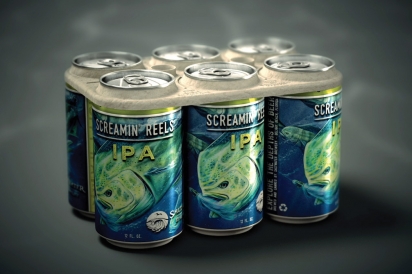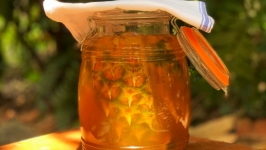Brown Bottles, Silver Cans, Green Brewing
You’ve seen the “Save Water, Drink Beer” t-shirt. But casual beer drinkers may not know that it can take six to eight gallons of water to produce one gallon of beer. So many craft breweries are doing their part to brew eco-responsible beer.
First, brewing requires an extensive amount of energy. New technologies have allowed many breweries to seek alternatives to conventional energy sources. In 2001, Uinta Brewing became the first business in Utah to become 100 percent wind-powered. Sierra Nevada, one of the country’s first craft breweries, has also been a leader in sustainable energy. Utilizing one of the nation’s largest private solar arrays with over 10,000 individual panels and four 250 kilowatt co-generation hydrogen fuel cells, they’re able to produce over half of their total electricity needs on site. Here in the Sunshine State, it only seems logical for local breweries to take advantage of this resource for power. Partnering with Solar Impact, Swamp Head Brewery in Gainesville became the first solar-powered brewery in the state. Other breweries around the country, including Stone, Highland, Lagunitas, New Belgium, Kona and Flying Fish, have installed significant solar power systems to fuel their operations.
Using Spent Grain
One major byproduct of beer production is spent grain. Brewers have found a variety of uses for this leftover barley that has had the majority of sugars extracted from it. Most donate or sell it to farmers for use as feed for cattle, chickens or even worms. Some cattle farmers have even reported that their cows prefer the spent grain because it begins to ferment before it’s fed to them – one can only imagine that they’re looking for the buzz that comes with it. Other farmers compost the grain to create nutrient-rich, natural fertilizer for their plants. Many breweries use this grain for in-house cooking, making breads, pizzas or other dough. Funky Buddha’s spent-grain pretzels are on their menu, and they’ve partnered with Whole Foods Markets to make an exclusive spent-grain bread from their Floridian Hefeweizen leftovers.
SaltWater Brewery is developing a new six-pack can holder using spent grain. This makes it completely edible by any fish or animal who may come into contact with it – a big development, since most plastic six-pack rings end up in the ocean and pose a serious threat to fish, turtles, sea birds and other wildlife. In 2011, Alaskan Brewing Co. developed a first-of-its-kind steam boiler, which feeds off spent grain, reducing their oil use by over 65 percent. This creates a unique cycle where they use the steam to make beer, then use the leftover grain to make steam, which makes more beer, and so on.
Reducing Emissions
Byproducts of brewing are the creation of CO2 and steam. Many breweries have invested in ways to reduce or reuse these emissions. A variety of breweries, including Alaskan, Brooklyn and Matt Brewing, have invested in CO2 reclamation systems that collect the naturally created carbon dioxide (released during fermentation) and utilize it for packaging or elsewhere in the brewing process. New Belgium and Founders use vapor-condensing units that capture the steam produced during the brewing process, then condense it to make water, which is used in various ways around the brew house instead of evaporating away.
When it comes to ingredient sourcing, many breweries aim to make the most eco-friendly purchasing decisions. Some – including Inlet Brewing, Bison Organic Beer and Peak Organic – buy organic ingredients, minimizing the impact of pesticides and other farming practices that harm the environment. Others who operate close to hop and barley-growing regions source as locally as possible to minimize fuel use in shipping. Rogue and Sierra Nevada have invested in growing many of their own ingredients. Rogue not only grows and malts their own grain and hops, they harvest their own honey from bees on property; grow pumpkins for their pumpkin beers; and even have in-house coopers who make their barrels. These breweries challenge themselves to be as self-reliant and sustainable as possible.
Craft breweries around the world are known for their innovation in their beers, and that extends to ways to help the environment. As a customer, you can support these companies and local businesses. Like bringing reusable bags to the grocery store, don’t forget about your growlers. They are infinitely reusable and help to minimize all of the energy that goes into packaging and shipping beer. In fact, now would be a great time to fill, drink, repeat!







